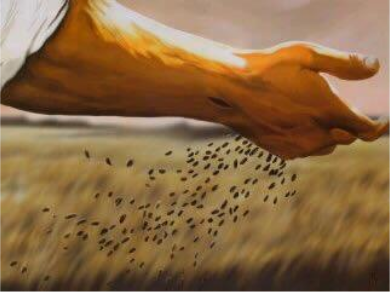Jesus’ Explanation of the Wheat and the Tares
Matthew 13:36–43
Then leaving the crowds, Jesus came into the house, and His disciples came to Him, saying, Explain to us the parable of the tares of the field.
And He answering them, said to them, He who sows the good seed is the Son of Man. And the field is the world; and the good seed, they are the sons of the kingdom; and the tares are the sons of the wicked; and the enemy who sows them is the Devil. And the harvest is the consummation of the age; and the reapers are the angels.
Therefore just as the tares are collected and burnt up by the fire, so shall it be in the consummation of this age. The Son of Man shall send out His angels, and they shall collect out of His kingdom all offenses, and those who do iniquity, and shall cast them into the furnace of the fire, where there shall be weeping and gnashing of teeth.
Then shall the just give forth brightness as the sun in the kingdom of their Father.
He who has ears to hear, let him hear.
The consummation of the age
AE 911.2. The Lord by [the parable of the wheat and the tares] illustrates all that is said in this chapter [14] of Revelation (in verses 14 to 19) respecting the Son of man having a sickle in His hand and reaping, and that the earth was reaped by Him and the angels....
AE 624.2–3. Why the Last Judgment does not come until the consummation, that is, when there is no longer any good or truth remaining with the men of the church, is wholly unknown in the world, although it is known in heaven. The reason is that there are two classes of men upon whom judgment is made. One class consists of the well-disposed, and the other of those who are not well-disposed. The well-disposed are the angels in the ultimate heaven, most of whom are simple, because they have not cultivated the understanding by interior truths, but only by exterior truths from the sense of the letter of the Word, according to which they have lived. For this reason their spiritual mind, which is the interior mind, was not indeed, closed, but neither has it been opened, as it is with those who have received interior truths in doctrine and in life. This is why they have become simple in respect to spiritual things, and are called well-disposed.
But the ill-disposed are those who have lived outwardly as Christians but inwardly have admitted evils of every kind into the thought and into the will, so that while in the external form they appeared to be angels, in internal form they were devils. When such come into the other life, they come into association for the most part with the well-disposed, that is, with the simple good who are in the ultimate heaven. For exterior things consociate, and the simple good are such that what appears in external form to be good they believe to be good, their thought not penetrating farther.
These ill-disposed must be separated from the well-disposed before the Last Judgment comes, and also afterward, and they can only be separated successively. This is why before the time of the Last Judgment the Word must still be taught, although interiorly, that is, in respect to its interiors, it is undelightful. And because these interior things are undelightful, the [ill-disposed] do not receive them. They only receive such things from the sense of the letter of the Word as favor their loves and the principles derived from them, on account of which the Word in respect to the sense of the letter is delightful to them. It is therefore by means of these interior things that the well-disposed are separated from the ill-disposed.
That for this reason the time is extended after the Last Judgment before the new church is fully established, is an arcanum from heaven which at this day cannot enter the understanding except with a few; yet this is what the Lord teaches in [this parable in] Matthew.... “The consummation of the age” signifies the last time of the church. That until then, the well-disposed are not to be separated from the ill-disposed, because they are consociated by outward things, is signified by “lest while you gather up the tares, you root up the wheat together with them.”
LJ 70. There were many reasons why such societies [of the ill-disposed], or such [false] heavens were tolerated. The main reason was, that by external holiness, and by external sincerity and justice, they were conjoined with the simple good, who were either in the lowest heaven, or were still in the world of spirits and not yet introduced into heaven. For in the spiritual world, there is a communication, and thence a conjunction, of all with their like. And the simple good, in the lowest heaven and in the world of spirits, look principally to externals, yet are not interiorly evil. Therefore if these [inwardly evil] spirits had been forcibly removed from them before the appointed time, heaven would have suffered in its ultimates; and yet it is the ultimate, upon which the superior heaven subsists, as upon its own basis.
Questions and Comments
- Why is it important for us to know about the Consummation of the Age and the Last Judgment?
- Like AE 624.2–3, most of the passages on this parable in the Heavenly Doctrine explain that it is about how the Last Judgment was effected. What does this process teach us about the Lord?
- Last Judgment 59 explains in more detail why the separation of the “wheat and the tares” took place over time, rather than all at once, if you are interested in further reading on the subject.
| previous |  |
next |
|---|


